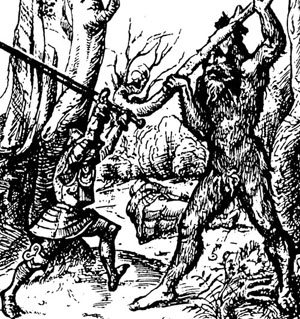I always try to teach my students to never believe something because someone tells you to. Skepticism is healthy, especially in a republic. All citizens need to have an instinct to seek out, inquire, and question to find the truth.
More practically, a certain level of discernment is particularly desirable while researching information on the internet. I'll never forget the Wikipedia article on Sparta I read a few years back that replaced all mentions of Leonidas with "King Poopypants."
To drive the point home, I recently threw together a quick lesson for my students, disguised as a refresher on the difference between primary and secondary sources.
I explained primary sources, documents or physical objects from the time we are studying. Things like letters, journals, etc. Then I gave them an example:
The dead numbered in the hundreds. As we dug a trench for their bodies, Mangini hit a stone. In the process of removing it, we discovered that it was not a stone, but a large bone. Assuming it belonged to some ancient and large elephant, we carried on. The smell of the bodies left us no time to delay….
We had just finished studying the Black Death, so the students caught the connection between mass graves, decaying bodies, and Italy pretty quickly.
Then I showed them another primary document. A drawing I said came from the same place and time period
I asked the students to speculate what kind of skeleton they found. Common answers: giants and Sasquatch.
Next we went over secondary sources, books, articles, etc that use primary sources to summarize what we know or guess about a time period. I showed them this excerpt from an article called "The Giants of Florence"
Legends of giants living in the Apennines Mountains date back to the early Roman Republic. When the Black Plague struck Italy, however, over a dozen enormously large skeletons were found as citizens hurriedly dug mass graves. Tales of the giant skeletons spread like wildfire. Fearing that the peasantry would begin to worship the bones and resurrect the religion of the Ancient Greeks and Romans, the Pope ordered all bones destroyed….
The tale of giants faded back into myth, until a peasant farmer in Tuscany, near Florence, uncovered a skeleton measuring nearly 15 feet tall. Scientists speculate that these remains are of early Greek setters.
I then showed them this picture:
The students gasped. They ooh-ed and ahh-ed. "Is that real?!" they asked. I just nodded and gave them a quick quiz on the difference between primary and secondary sources, and the readings. Two questions were.
Well, no. He lied, under oath, before a Senate Committee about the extent of our government's surveillance on American citizens. And surprise, surprise, he's not the first government official to lie. The good news is, as long as we do have people like Edward Snowden who aren't afraid to bring the truth to light, our Republic is going to be in good shape.
More practically, a certain level of discernment is particularly desirable while researching information on the internet. I'll never forget the Wikipedia article on Sparta I read a few years back that replaced all mentions of Leonidas with "King Poopypants."
To drive the point home, I recently threw together a quick lesson for my students, disguised as a refresher on the difference between primary and secondary sources.
I explained primary sources, documents or physical objects from the time we are studying. Things like letters, journals, etc. Then I gave them an example:
The dead numbered in the hundreds. As we dug a trench for their bodies, Mangini hit a stone. In the process of removing it, we discovered that it was not a stone, but a large bone. Assuming it belonged to some ancient and large elephant, we carried on. The smell of the bodies left us no time to delay….
…when we found the skull , all dropped to
their knees and crossed themselves.
Immediately Luigi ran for a priest, who when seeing the monstrosity, ran
back to his abbey.”
We had just finished studying the Black Death, so the students caught the connection between mass graves, decaying bodies, and Italy pretty quickly.
Then I showed them another primary document. A drawing I said came from the same place and time period
 |
| I added a strategically placed Spongebob over that weird leafy thing. |
Next we went over secondary sources, books, articles, etc that use primary sources to summarize what we know or guess about a time period. I showed them this excerpt from an article called "The Giants of Florence"
Legends of giants living in the Apennines Mountains date back to the early Roman Republic. When the Black Plague struck Italy, however, over a dozen enormously large skeletons were found as citizens hurriedly dug mass graves. Tales of the giant skeletons spread like wildfire. Fearing that the peasantry would begin to worship the bones and resurrect the religion of the Ancient Greeks and Romans, the Pope ordered all bones destroyed….
The tale of giants faded back into myth, until a peasant farmer in Tuscany, near Florence, uncovered a skeleton measuring nearly 15 feet tall. Scientists speculate that these remains are of early Greek setters.
I then showed them this picture:
| Clearly not a hoax. |
- How many feet long was the skeleton recently found?
- What do scientists speculate is the origin of the skeleton?
The answers:
- There was no skeleton
- It's all a joke. Don't believe everything you read or hear, even from your teacher.
My students were surprised and relieved that no creepy giant skeletons existed. While I hate to sow any seeds of distrust, I think the bigger message is more important. This nation needs skeptics. We need people to question authority, doubt the message. The alternative looks a lot like Orwell's 1984. The NBC interview with Edward Snowden (which I showed to my 8th graders today), drove the point home.
Here's a picture of James Clapper, our Director of National Intelligence. Here's a man we can trust, right?
 |
| A true American hero. |
Like Orwell said, "In a time of universal deceit, telling the truth is a revolutionary act." So while my government wants to arrest Snowden for telling us the truth about how much our government is watching us, I'd like to thank him for standing up as an example of courage to our nation.
PS. If you want, I'll be happy to email the Powerpoint of the lesson to you. It only takes about 10 minutes!
PS. If you want, I'll be happy to email the Powerpoint of the lesson to you. It only takes about 10 minutes!
No comments:
Post a Comment